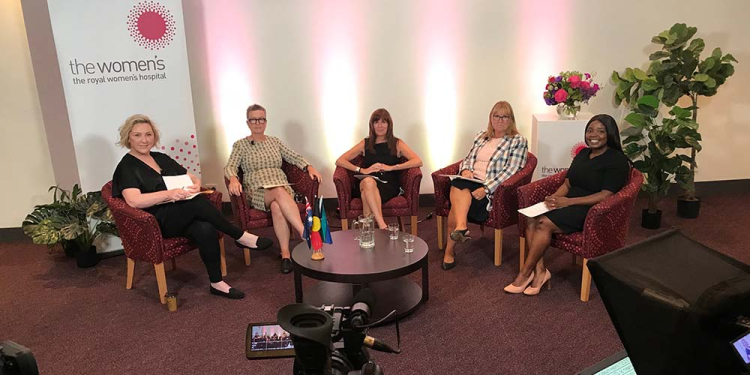
The Royal Women’s Hospital has celebrated International Women’s Day with an online discussion exploring how sex and gender impact health and healthcare.
Minister for Innovation, Medical Research and the Digital Economy The Hon. Jaala Pulford introduced the event – speaking of the need to break the glass ceiling for women working in STEM and tackle gender bias and its impact on health outcomes.
“I always think of International Women’s Day as part celebration and part rage, and outrage,” she told the online audience.
“There’s a historical bias in research and therefore in health outcomes as well. I’m particularly agitated and outraged about endometriosis as but one, very powerful example. It’s hard to imagine that there would be a condition as debilitating affecting one in 10 blokes that would still have a seven-and-a-half-year average time from onset of symptoms to diagnosis.”
The panel, facilitated by comedian, author and broadcaster Meshel Laurie, consisted of Martha Hickey, Professor of Obstetrics and Gynaecology; Clare Manning, Director of Social Model of Health; Dr Tanaka Dune, Urogynecologist; and Professor Sue Matthews, Chief Executive of the Women’s.
Professor Hickey said gender bias was pervasive and negatively impacted everyone in society.
“In 2020 the United Nations conducted a survey that found that 90 per cent of people held a gender bias against women. It’s important to recognise how highly prevalent this bias is and think about what the effects of it are – it’s going to influence behaviour and that will then lead to discrimination. And everyone suffers,” she said.
Professor Matthews cited a recent example of bias in medical research stemming from the pandemic.
“Seventy per cent of people who reported side-effects of COVID are women, but only 4 per cent of the studies have actually differentiated women and men’s experiences with COVID vaccines. It’s mind boggling,” she said.
Ms Manning described it as akin to men being “the baseline”.
“It’s almost as though males are the norm; they’re the baseline. We’re not the norm despite being 50 per cent of the population,” she said.
The discussion was broad ranging – touching on everything from the impacts of social media and the Kardashians, to fear of menopause, the colour of period blood in advertisements and breastfeeding in public.
“There’s a systemic, engrained way of approaching women and their bodies – starting from little girls – that makes them really ashamed,” Dr Dune said.
“When women come and see me I use mirrors and the very first reaction is ‘No I don’t want to see anything’ and the next reaction is ‘Oh that looks disgusting’. I really doubt many men have a problem saying ‘that looks disgusting’ about their appendage.”
This year’s International Women’s Day campaign calls on individuals to collectively #BreakTheBias.
Professor Matthews said improving health outcomes required access to individualised healthcare and inclusion in the research that underpins it.
“We’re funded between 70 and 75 per cent of our work. It takes governments who have vision, it takes philanthropists who have the vision, and it takes us,” she said.
The annual event was again supported by partners BankVic and Hesta.